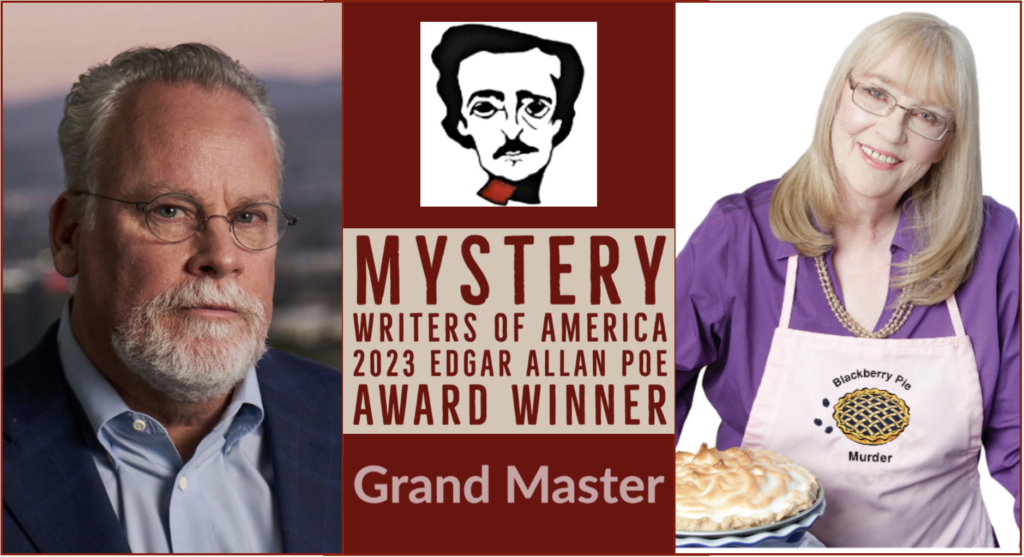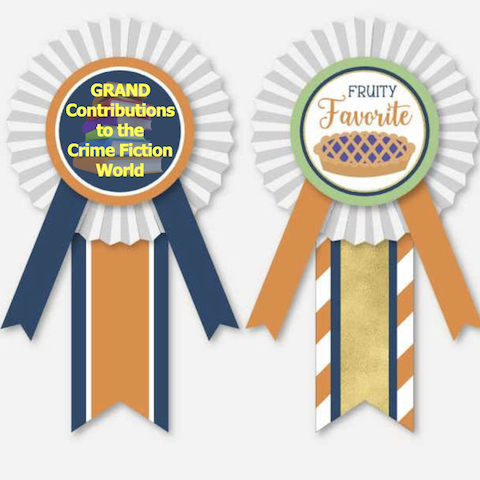WARNING: This post is a rant. You might get a laugh, you might cringe, you might be offended, you may get bored.
The Grand Master Award is a big deal, or at least it should be. It was established by the Mystery Writers of America (MWA) to “recognize important contributions to the mystery field over time, as well as a significant output of consistently high quality.” Full membership in the MWA is open to authors who have had a book published by one of the organization’s acceptable commercial publishers. (No self-publishing authors.) So the MWA Grandmaster Award is peer recognition for a body of work, a lifetime achievement award, as it were.
The MWA Grandmaster Award has a long history. The first Award was given to Agatha Christie in 1955. Nearly every year afterward, 62 years in all, stellar crime fictionists were celebrated by the awarding of The Grand Master. Only 9 times out of the 62 years did the Award Committee decide to give more than one person the honor; mostly it has been since 2009. There were 53 years of a single honoree.
I never gave it much thought until my favorite author, Michael Connelly, was given the honor this month (January 2023) along with a writer I had never heard of, Joanne Fluke. I felt Connelly had been cheated of the singular limelight which he fully deserves.

Other organizations award similar honors. For example in the UK, the Crime Writer’s Association (CWA) has been giving a “lifetime” award since 1986. It’s called the Diamond Dagger Award, presented to “writers whose careers are marked by sustained excellence, and who have made a significant contribution to crime fiction published in the English language, whether originally or in translation.” Michael Connelly was given this award in 2018. The CWA never gave this award to two people in one year.
Crime Writers of Canada (CWC) has also given a Grand Master Award; it is presented biennially to recognize a Canadian crime writer with a substantial body of work who has garnered national and international recognition. These awards are relatively recent, with Louise Penny the most recent recipient in 2022. The CWC has never given their Grand Master award to two people in one year.
It is hard to compare the work of Michael Connelly to Joanne Fluke, but I am going to try to do it anyway. But I shouldn’t have to. And neither recipient should have to share this award that traditionally honors one outstanding crime fiction contributor.
The Mystery Writers of America is the original and oldest association of mystery writers and it encompasses writers from all sub-genres of crime fiction. While I try to sample and learn about all types of mystery stories, I admit that “cozy” mysteries do not occupy much of my reading time. And even though I know they are much beloved by millions of readers, I don’t have a high regard for mysteries featuring talking cats, knitting circle sleuths, beauticians, priests, and bakers. I do not object to cozy writers getting a Grand Master Award if their body of work, like Agatha Christie’s is significant!
I know you are wondering why I bother writing about this, given that I have no problem with a cozy writer like Elizabeth Peters or Barbara Neely or Dorothy Gilman getting a MWA Grand Master. But each of these contributed something unique to crime fiction. Their characters are pace-setting and memorable!
On the other hand, what is unique about Michael Connelly and Joanne Fluke — and how do they compare?
| JOANNE FLUKE | MICHAEL CONNELLY |
|---|---|
| 40 books written 1980-2022 | 37 books written 1992-2022 |
| Main Series: Cozy murder books featuring Hannah Swensen, bakery manager; in fictional small town in Minnesota. | Main Series: Police procedural and courtroom thrillers featuring half-brothers Detective Harry Bosch and Attorney Mickey Haller; in Los Angeles. |
| Average # of pages per book: 330 | Average # of pages per book: 481 |
| Awards given for individual books: None | Awards given for 22 of the 37 books: 52 ! |
| Books converted to film: 6 All in the Murder, She Baked series by Hallmark. | Books converted to film: 19 • Big Screen: Blood Work & The Lincoln Lawyer. (2 books) • 7 Seasons of Bosch on Amazon Prime. (14 books) • The Lincoln Lawyer – 1 season on Netflix. (1 book) • Bosch Legacy – 1 season on Amazon FreeVee. (2 books) |
| # of Goodreads Ratings & Reviews* for 2018 book (Raspberry Danish Murder): 8,340 / 1,068 | # of Goodreads Ratings & Reviews* for 2018 book (Dark Sacred Night): 58,424 / 4,243 |
| # of Goodreads Ratings & Reviews for 22nd book published (Plum Pudding Murder – 2009): 12,219 / 797 | # of Goodreads Ratings & Reviews for 22nd book published (The Reversal – 2010): 67,895 / 3,711 |
| # of short stories published: 0 | # of short stories published: 25+ |
| Total Books Sold: Unknown. I am guessing not more than 3.5 million. | Total Books Sold: 80 million. |
* Note: The number of ratings and reviews is indicative (in a very general, but comparative, way) of a fraction of the number of readers of a book.
Connelly’s work set a new approach to police detective procedurals by increasing the credibility of his sometimes wild plots by interlacing many current events, real police procedures [where timing permitted], real policing anecdotes, and real locations in LA. Connelly did this by utilizing his 10+ years of being a crime reporter and by using many contacts within the LAPD to verify the procedures. It’s true that Joseph Wambaugh pioneered realistic police fiction beginning in the 1970s by using his experiences as a cop. And Wambaugh received the Grand Master award in 2004. But Wambaugh wrote about patrol cops and his style is full of dark irony, while Connelly writes about LAPD detectives and his style is like that of a news feature reporter. Connelly’s books have been pace-setting for other police detective writers around the world.

Fluke’s work is similar to many others in the culinary mystery sub-sub-genre. Yet Diane Mott Davidson was doing this for ten years before Fluke and the other “recipe in a murder mystery” writers. Davidson even won three awards for her first book; but never got a Grand Master award. I cannot conceive of any criteria that points to Fluke as a “Grand Master of Crime Fiction.” But if the criteria is volume of books written – OK. [Although there are hundreds of mystery authors who have written the same or greater number of books.] But give her the award in some other year. At the very least, tell us the specific criteria that led to the selection!
I wish the MWA would stop giving the Grand Master award to more that one person in one year. There are not two gold medals for specific Olympic events or other sporting competitions in one year.



Well expressed, Dick ~
I find that this is just one of many signs ‘out there’ that quality has greatly deteriorated in our society and perhaps, it comes from the need to be all inclusive ~ s stretch’ of Connelly’s ‘Everybody counts or nobody counts’ which has its place in our culture ~ but if an organization is going to give an Award than that is not inclusive but rather exclusive and the criteria should mean something ~ Understand your need to ‘rant’ ~ very appropriate.
Thanks Carol. 🙂
Dick,
I totally agree with you. It seems totally inappropriate and a slight to Connelly. I wonder how he feels about it. And I wonder if other fans voiced their opinions….similar opinions. I’d love to see some of those if they are available.
Thanks Selena. 🙂
So far I have not seen any question about this raised by others. I mentioned it in a thread on the Bosch fans Facebook group, but just briefly, and no response by anyone.
While I could not agree more that Michael Connelly richly deserves the title of Grand Master, so does Joanne Fluke. For one thing, the Grand Master does usually go to 2 people – foe example, Ellen Hart and Walter Mosely won the same year, as did Robert Crais and Carolyn Hart. While Connelly has rightfully garnered every award in the biz, Joanne Fluke has been toiling away and contributing to the genre in a different way. I used to be a bookseller, and I can tell you that cozies far outsold the tough guy stuff. Our best selling author was Agatha Christie. Women buy 4 or 5 of them at a time. They are the powerhhouse of the genre, helping to allow guys like Connelly to be published in the first place. They are the little engines that could of the genre. You are just speaking to relative literary “virtue” but there are all kinds of virtues. Michael Connelly is a really nice guy, and I’m sure he doesn’t mind sharing a bit. Male authors get the lions’ share of attention and awards – it’s really nice of the MWA to share the love.
Hello Robin! I appreciate that you have taken the time to respond thoughtfully to my post about the double MWA Grandmaster Awards for 2023. I still believe that giving one award a year is best for all. The Grandmaster does not “usually go to 2 people” as you state. The first Grandmaster was given in 1955. From that year to this makes 68 years; however during a random 6 years, mostly in the early years, no Grandmaster was given. That leaves 62 Grandmaster Award Years. Of those, in only ten years was the award given to more than one person. In other words, 84% of the time it was given to one person. I wish they would go back to that. Let each year’s Grandmaster be able to revel in the title. You have an important point that recognition should properly be given to women author. It is better now: During the last 30 years, I count 18 woman authors named a Grandmaster, and 22 men. There is no doubt that Sisters in Crime have had a successful impact, and there is more work to be done. I understand that woman purchase the most crime fiction, and that is not just cozies. I am not a fan of cozies/traditional mysteries, but there are some that far better than others. I see many women writers who did something original, something unique, something that establishes a new “angle” to mystery stories who have been recognized as Grandmaster. I have no quibble with them. But Joanne Fluke, is not original, or unique, … so I just don’t get it. (As I wrote above, it was Diane Mott Davidson that pioneered the foodie cozy, so it might make sense for her to get a Grandmaster – in a separate year. Nita Prose’s The Maid is so original that she should get a Grandmaster for that alone. But we’ll see how it goes for her.) The male/female issue IS important in assigning the Grandmaster. But do we want to deliberately have a male and female Grandmaster each year? I think not, personally. (Maybe alternate female/male years if it works.) They should consider the scale and unique concept of the contribution. And have one Grandmaster per year, that’s mainly what I am saying. Again thanks for your comments.